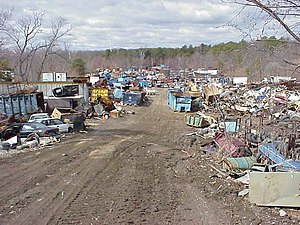
- Image via Wikipedia
AMONG those suffering from the global recession are millions of workers who are not even included in the official statistics: urban recyclers — the trash pickers, sorters, traders and reprocessors who extricate paper, cardboard and plastics from garbage heaps and prepare them for reuse. Their work is both unrecorded and largely unrecognized, even though in some parts of the world they handle as much as 20 percent of all waste.
The world’s 15 million informal recyclers clean up cities, prevent some trash from ending in landfills, and even reduce climate change by saving energy on waste disposal techniques like incineration.
They also recycle waste much more cheaply and efficiently than governments or corporations can, and in many cities in the developing world, they provide the only recycling services.
But as housing values and the cost of oil have fallen worldwide, so too has the price of scrap metal, paper and plastic. From India to Brazil to the Philippines, recyclers are experiencing a precipitous drop in income. Trash pickers and scrap dealers in Minas Gerais State in Brazil, for example, saw a decline of as much as 80 percent in the price of old magazines and 81 percent for newspapers, and a 77 percent drop in the price of cardboard from October 2007 to last December.
In the Philippines, many scrap dealers have shuttered so quickly that researchers at the Solid Waste Management Association of the Philippines didn’t have a chance to record their losses.
In Delhi, some 80 percent of families in the informal recycling business surveyed by my organization said they had cut back on “luxury foods,” which they defined as fruit, milk and meat. About 41 percent had stopped buying milk for their children. By this summer, most of these children, already malnourished, hadn’t had a glass of milk in nine months. Many of these children have also cut down on hours spent in school to work alongside their parents.
Families have liquidated their most valuable assets — primarily copper from electrical wires — and have stopped sending remittances back to their rural villages. Many have also sold their emergency stores of grain. Their misery is not as familiar as that of the laid-off workers of imploding corporations, but it is often more tragic.
Related articles by Zemanta
- New study underscores the importance of recycling and composting in achieving Zero Waste in Greater Vancouver (newswire.ca)
- Converting Garbage into Fuel (technologyreview.com)
- New Earth Solutions launches investment fund (businessgreen.com)
![Reblog this post [with Zemanta]](http://img.zemanta.com/reblog_b.png?x-id=62ea1da2-0d2f-4d11-8e89-68f170fd533d)







